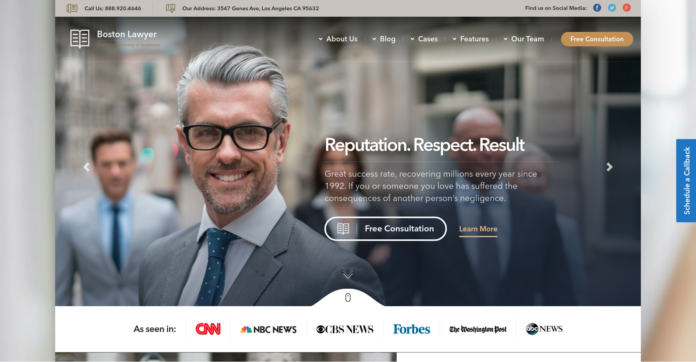Navigating the vast digital space today, potential clients are often overwhelmed by the choices they face. For law firms, striking the right chord in the digital realm can be the difference between gaining a loyal client and losing a potential lead. At the heart of this challenge is the website design, a silent yet powerful tool that communicates values, professionalism, and trustworthiness. Today, we’ll explore how the right digital aesthetic choices can transform your law firm’s online presence.
Elements of Trustworthy Website Design

A digital platform’s essence, especially in the realm of law firm website design, should encapsulate the firm’s ethos. Picture this: a visitor lands on your webpage and within seconds can gauge your firm’s values, the services you provide, and even the likely quality of your legal counsel. What differentiates a forgettable online visit from a memorable one, leading to potential client conversion?
Quality design is more than just aesthetic appeal; it’s about building a foundation of trust. In our visual-centric world, people often gauge trustworthiness by what they see, especially during that crucial first impression. For legal institutions, the stakes are even higher given the seriousness of their services. A website’s appearance can influence a visitor’s perception of a firm’s reliability, credibility, and professional standing.
Clear and User-Friendly Navigation
When potential clients seek legal advice, they’re usually stressed or in a hurry. A website that’s tricky to navigate only heightens their anxiety. Easy navigation and a clear website structure guide users effortlessly, offering them a hassle-free experience.
On the other hand, an intuitive layout helps visitors find the exact service they need, understand your firm’s offerings, and reach out with ease. Law firms should ensure their website offers clear calls to action, distinct service categories, and a simplified search mechanism. This not only provides convenience but also communicates your firm’s respect for client time and needs.
Professional Branding and Visual Identity

A law firm’s brand identity is synonymous with its reputation. A robust visual representation, encompassing a firm’s values, can have a lasting impression on potential clients. Professional graphics, cohesive color schemes, and a well-thought-out logo can communicate reliability and trust.
Yet, a visual brand goes beyond just images. Consistent typography, appropriate imagery, and a harmonious color palette all play pivotal roles. They create an ambiance of professionalism, assuring clients of the quality of service they can expect. Remember, in the online space, your website is often the first interaction a potential client has with your firm; make it count.
Responsive Design for Accessibility
Gone are the days when clients accessed websites solely through desktops. Today, smartphones and tablets are primary sources of web access. Ensuring your website adapts seamlessly across devices is crucial, signaling to users that you are up-to-date and accessible.
Responsiveness also plays a role in search engine rankings. Websites that aren’t mobile-friendly often suffer on search engine results pages, leading to reduced visibility. For law firms, this adaptability not only ensures a wider reach but also communicates their commitment to accessibility for all clients, regardless of how they access the site.
Engaging Content and Legal Expertise

While design captures attention, it’s the content that holds it. Rich, engaging content that demonstrates legal proficiency can make a visitor stay, read, and potentially reach out. Whether it’s blog posts, articles, or news updates, your content should showcase your firm’s depth of knowledge.
But showcasing expertise isn’t merely about listing qualifications. It’s about offering valuable insights, breaking down complex legal jargon into comprehensible information, and presenting it in a manner that resonates with potential clients. This not only establishes authority in the field but also fosters trust among visitors.
Testimonials and Case Studies
Word of mouth in the digital age often comes in the form of testimonials and case studies. Displaying these on your website offers authentic insights into your firm’s prowess. It’s evidence of past successes and satisfied clientele.
Case studies offer a deeper dive, showcasing the firm’s approach to challenges and solutions provided. Through these real-life scenarios, potential clients can envision how you might handle their unique situations. In essence, these elements serve as endorsements, cementing trust in your firm’s capabilities.
Security Measures and Privacy Assurance

In an era rife with cyber threats, guaranteeing online safety is paramount. Ensuring your website has robust security measures not only protects sensitive data but also assures visitors of their safety. Icons indicating security certificates or SSL encryption can foster trust.
Privacy assurances, especially regarding client data, are equally crucial. Clear privacy policies and measures to protect client information emphasize your firm’s dedication to client welfare, reinforcing trust in your digital environment.
Contact and Communication Channels
Effective communication is the cornerstone of any successful client-lawyer relationship. Easy-to-find contact details and diverse communication channels emphasize your firm’s commitment to openness and transparency.
Options like live chats, chatbots, or even simple query forms can enhance user experience. They allow potential clients to initiate conversations, ask questions, and establish an immediate connection. The easier you make it for visitors to reach out, the more likely they are to do so.
Compliance and Ethical Considerations

Law firms operate in a realm where ethics and compliance are paramount. Highlighting your firm’s adherence to legal standards and ethical considerations online can further instill trust. Clear mentions of certifications, affiliations, and regulatory compliances assure visitors of your firm’s credibility.
Transparency in terms of service terms, fees, and processes can enhance this trust. When potential clients perceive that a law firm is not only competent but also forthright and ethical, they’re more likely to engage.
Final Thoughts
In the vast digital world, first impressions often dictate choices. For law firms, where trust is the linchpin of client relationships, the design of their digital platform can be a game-changer. A well-thought-out, user-friendly, and credible website can be the difference between a fleeting visit and a lasting professional relationship. As you consider or reconsider your firm’s online presence, remember that every design choice speaks volumes. Craft an online narrative that not only looks good but feels right to every visitor.







